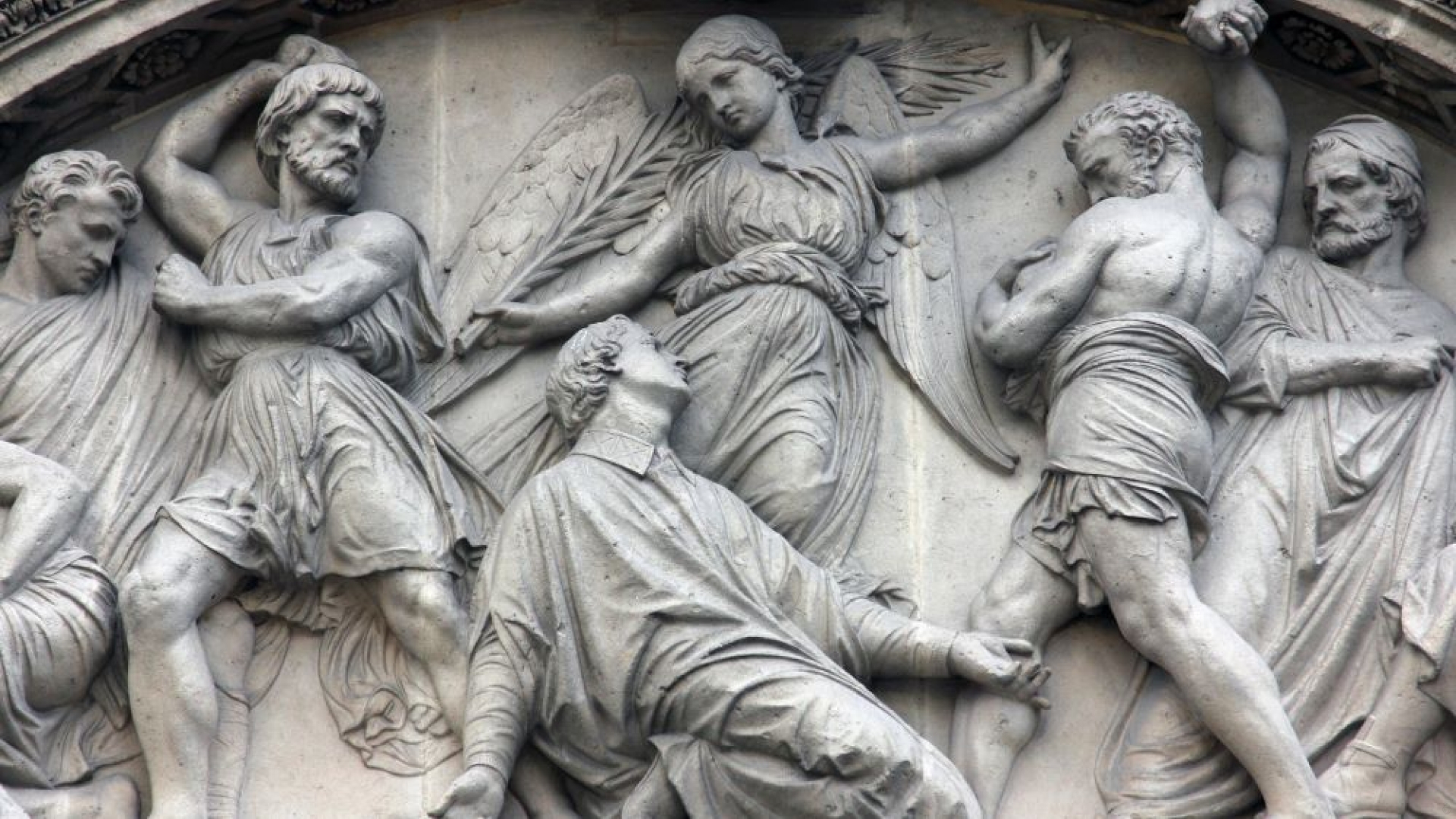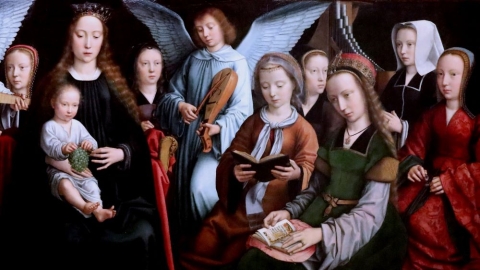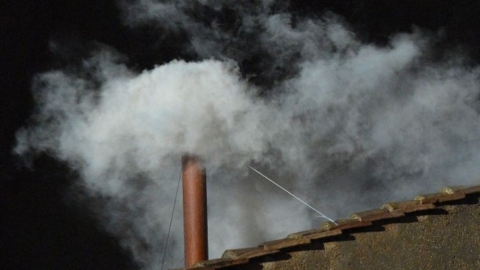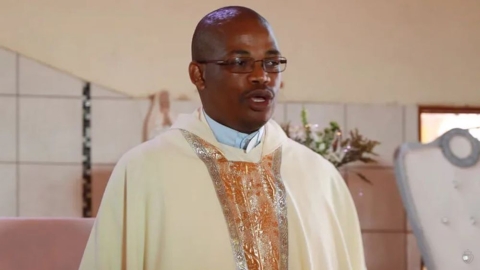The Holiness of the Church (12): The Virtue of Fortitude and Martyrdom

Martyrdom of Saint Stephen
Fortitude is a cardinal virtue that allows you to strengthen the irascible appetite to the point of not failing to pursue a difficult good, even in the face of the greatest dangers for the body. It thus allows us to overcome all fears, including that of death, to remain united to God. In saints, and especially in martyrs, this virtue is accompanied by the gift of the Holy Ghost.
Christian Martyrdom as an Apologetic Argument: Formal Element
One cannot deal with fortitude without first examining the question of martyrdom, which is the most complete and most evident expression of this virtue. The martyr is not simply the one who dies for the faith or for an ideal, but the one who, in his victory over the fear of death, manifests a superhuman divine power, thus becoming a witness not only of the faith, but of the supernatural work of the Holy Ghost in the Church.
In this sense, the presence of authentic martyrs is only possible in the true Church, even if some men died in various ways out of loyalty to false religions or heresies. This is why it is necessary to understand what distinguishes this supreme act of virtue and gift of fortitude (only possible with divine fortitude) from simple death in order to testify to a principle.
The martyr does not die out of pride or to demonstrate his superiority, but he remains humble, hoping for God's help; he does not die out of fear, like an insensitive person, but knowing well the value of what he renounces and out of love for true life. He does not die because he did not realize the danger, through stupidity or imprudence, but by having assessed it and by relying on God.
The true martyr therefore dies in the harmony between the different virtues and in the victory over the passions, and not by their absence. Above all, he dies through love and not through hate, by forgiving and not by cursing.
The Material Element of Martyrdom
Above all, martyrdom must take place in order to bear witness to the truth of the revealed faith, or to a virtue closely linked to it. Indeed, preferring virtue to death can be a way of professing faith in acts. Any action that presupposes faith can be a cause of martyrdom.
For the virtue of fortitude to manifest itself to its heroic degree, it is then necessary to overcome the strongest fear there is, namely the fear of death. The martyr will be such if he is confronted with torments which, by themselves or accidentally, can lead to death. In rare cases (St. John the Apostle or St. Thecla), the Church celebrates as martyrs saints who, having accepted death, have been delivered from it by divine intervention. They in fact performed the heroic act of virtue and it was only accidentally that death did not occur.
The Church honors the saints as martyrs even when the torments are not fatal in themselves, but death is the consequence. This is the case of St. Marcellus, pope towards the end of the persecutions, who died as a result of the imprisonment and punishments inflicted on him, or of several saints who died in exile.
On the other hand, we do not speak of martyrdom for the saints who certainly suffered torments for the faith, but not mortal or not until death: the Church wants to show, in those she honors with this title, the real and visible exercise of the heroic degree of virtue, with the manifest victory over the greatest fear innate to man.
Examples of Heroic Fortitude Among the Holy Martyrs
In the light of the foregoing, how is it possible to recognize true martyrs, who die in this balance of virtue, exalted recklessness, or proud stubbornness?
The highest sign of true martyrdom is given first of all by imitating Christ forgiving His persecutors. This manifestation of charity will be at the same time the most indisputable sign of the heroism of fortitude and will exclude pride.
Since St. Stephen, all Catholic martyrs have forgiven their persecutors. At the dawn of the 20th century, St. Maria Goretti (1890-1902), on her deathbed, speaking of her attacker, said to her mother: “For the love of Jesus, I forgive him; I want him to come with me to Heaven.”
In the responses of the martyrs to their persecutors, we often see that it is not pride or immobility that speaks, but truly a superhuman fortitude full of love and not hate. St. Gordian replying to the tyrant who threatened him with death if he did not renounce Jesus Christ, said: “Are you threatening me with death? I regret that I cannot die more than once for Jesus Christ.”
Thus St. Procopius, tormented, said: “Torment me as much as you want; but know that for those who love Jesus Christ, there is nothing more dear than to suffer for Him. St. Bernard comments: “Perhaps these saints spoke thus because they were stupid and insensitive to torment? No, writes the saint: Hoc non fecit stupor, sed amor, it is not out of stupidity, but out of love.”
We also find that Christian martyrdom was suffered by people of all ages and conditions, which disadvantaged the persecutors themselves, who saw themselves defeated by decrepit boys, girls, or men. It is precisely for this reason that many conversions have taken place.
At the age of fourteen, St. Vitus was first tormented with hot irons, then lacerated in his bowels. His father, who was a pagan and had denounced him in the hope that under threat of execution he would forsake the faith, wept with grief at seeing his son perish. The son then said to him: “No, my father, by this death I will not perish, but I will go to reign in heaven forever.”
In a case like this, we have a strong grown man who cannot resist the mere sight of the suffering he himself has caused, and a boy who bears torment with joy, upsetting human schemes in a truly evangelical way.
Related links
- La sainteté de l’Eglise (10) : la vertu de religion
- La sainteté de l’Eglise (8) : la vertu de prudence
- La sainteté de l’Eglise (9) : la vertu de justice
- La sainteté de l’Eglise (7) : la vertu de charité-2
- La sainteté de l’Eglise (6) : la vertu de charité-1
- La sainteté de l’Eglise (5) : la vertu d’espérance
- La sainteté de l’Eglise (4) : la vertu de foi-2
- La sainteté de l’Eglise (3) : la vertu de foi-1
- La sainteté de l’Eglise (2) : la note apologétique
- La sainteté de l’Eglise (1) : le dogme
- La sainteté de l’Eglise (11) : la piété et l’obéissance
(Source : FSSPX.Actualités)





